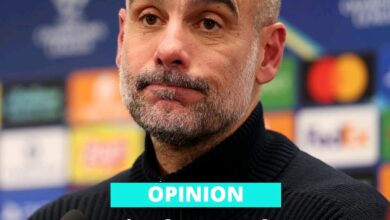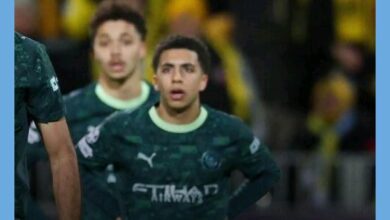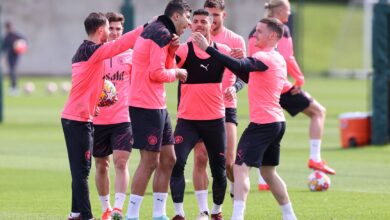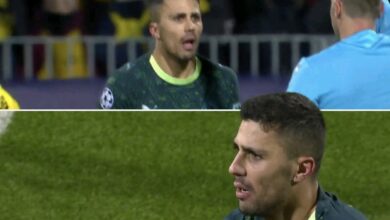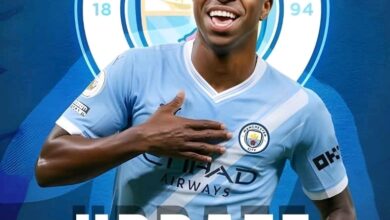Jack Grealish to Arsenal transfer path finally cleared as Mikel Arteta handed dream deal
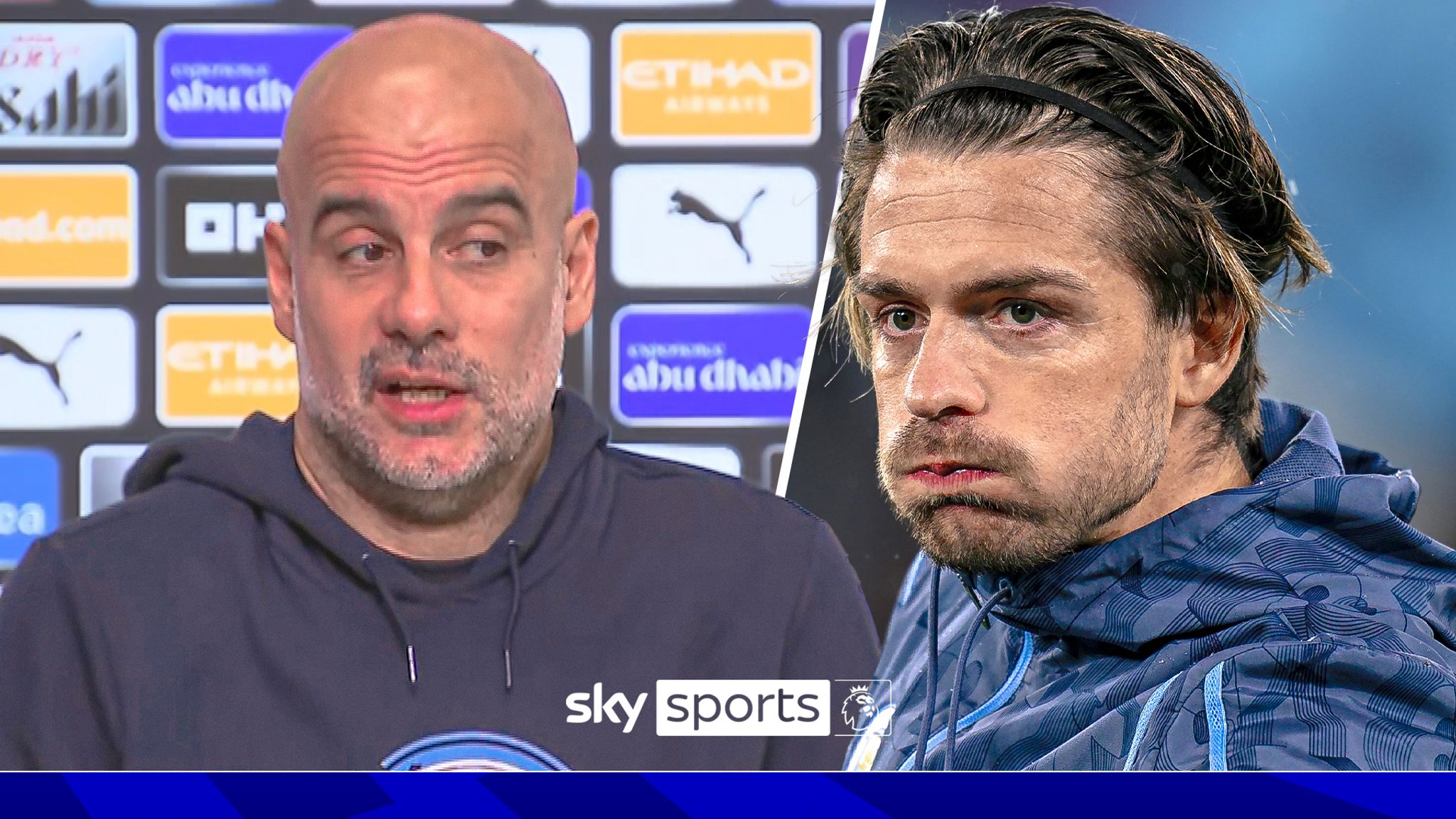
Arsenal’s pursuit of Premier League glory continues to face obstacles, with the Gunners falling short of the title for three consecutive seasons despite significant investment and tactical improvements under Mikel Arteta. As the summer transfer window approaches, the North London club finds itself at a crucial juncture, needing strategic reinforcements across multiple positions to bridge the gap to Manchester City and compete at the highest level.
While much of the transfer speculation has centered around Arsenal’s desperate need for a clinical striker, an unexpected opportunity has emerged that could address multiple tactical concerns in one fell swoop. Jack Grealish, Manchester City’s £100 million winger, has found himself increasingly marginalized under Pep Guardiola, creating a potential pathway for Arsenal to secure one of England’s most talented wide players.
Arsenal’s Current Predicament
The Title Chase Challenge
Arsenal’s recent campaigns have followed a frustratingly familiar pattern. Strong starts, periods of brilliance, and ultimately falling short when it matters most. The Gunners have established themselves as genuine title contenders, consistently finishing in the top four and pushing City harder than any other team in recent years. However, the final step – actually winning the Premier League – has remained elusive.
The margins at the top of English football are incredibly fine, and Arsenal’s inability to break down defensive teams has been a recurring theme throughout Arteta’s tenure. While the Spanish manager has transformed the club’s defensive solidity and overall tactical structure, the creative burden has often fallen on too few players, particularly in crucial moments during the business end of the season.
Positional Priorities
Andrea Berta’s appointment as sporting director signals Arsenal’s intention to professionalize their recruitment strategy further. The Italian’s experience at Atletico Madrid, where he oversaw numerous successful transfers and player development projects, brings credibility to Arsenal’s transfer operations. Under his guidance, the club has identified several key areas requiring strengthening.
The striker position remains the most obvious need. Arsenal’s reliance on Kai Havertz, while successful in many respects, has highlighted the lack of a natural goal-scorer who can consistently find the net in high-pressure situations. Viktor Gyokeres and Benjamin Sesko represent the profile of player Arsenal seeks – young, hungry, and capable of leading the line for a title-challenging team.
Martin Zubimendi’s impending arrival addresses the midfield depth concerns that have plagued Arsenal in recent seasons. The Spanish international’s ability to control tempo and provide defensive stability will give Arteta greater tactical flexibility, particularly in high-stakes matches where game management becomes crucial.
However, it’s the left-wing position that has quietly become one of Arsenal’s most pressing concerns, and where Jack Grealish could provide the perfect solution.
The Left Wing Conundrum
Gabriel Martinelli’s Plateau
Gabriel Martinelli’s development trajectory appeared unstoppable during his breakthrough seasons at Arsenal. The Brazilian’s pace, direct running, and finishing ability made him one of the most exciting young talents in European football. However, his recent campaigns have shown signs of stagnation, with his goal and assist numbers failing to reach the levels expected of a winger at a title-challenging club.
Scoring just ten goals across all competitions while providing only six assists represents a significant drop-off from his previous standards. For a player operating in one of Arsenal’s most advanced positions, these numbers suggest either a tactical issue, a confidence problem, or perhaps the natural growing pains of a young player learning to handle increased expectations and defensive attention.
Martinelli’s struggles aren’t entirely his own fault. Arsenal’s tactical system sometimes isolates wingers, expecting them to create magic from limited service or space. The Brazilian’s direct style, while effective against certain opponents, has occasionally lacked the guile and creativity needed to unlock stubborn defensive setups.
Leandro Trossard’s Limitations
Leandro Trossard’s signing initially appeared to be a masterstroke – a versatile, experienced player capable of contributing across multiple positions. The Belgian’s technical ability and work rate made him a valuable squad member, but his impact has been inconsistent when thrust into a starting role.
Entering the final year of his contract, Trossard represents both an opportunity and a concern for Arsenal. His experience and versatility make him valuable, but his age profile and recent performances suggest he may not be the long-term solution to Arsenal’s left-wing needs. The uncertainty surrounding his future adds another layer of complexity to Arsenal’s transfer planning.
Jack Grealish: The Unexpected Solution
Manchester City’s Mismanagement
Jack Grealish’s situation at Manchester City represents one of the most puzzling player management scenarios in recent Premier League history. When City paid £100 million to secure his services from Aston Villa in 2021, they were acquiring one of the most exciting English talents of his generation – a player capable of single-handedly changing games through his dribbling, creativity, and ability to draw fouls in dangerous areas.
However, Pep Guardiola’s tactical demands have appeared to stifle many of the qualities that made Grealish such an exceptional player at Villa Park. The rigid positional play required in City’s system has often seen Grealish deployed in roles that don’t maximize his natural strengths, leading to frustration for both player and manager.
The 29-year-old’s exclusion from City’s squad for their final Premier League match against Fulham was particularly telling. Having started just one top-flight game since Christmas, Grealish has clearly fallen down the pecking order at the Etihad Stadium. This dramatic fall from grace creates an opportunity that Arsenal would be foolish to ignore.
Tactical Fit at Arsenal
Grealish’s skill set aligns perfectly with several of Arsenal’s tactical needs. His ability to receive the ball in tight spaces, turn defenders, and create shooting opportunities could address their struggles against low defensive blocks. Unlike some wingers who rely purely on pace or crossing ability, Grealish’s game is built around close control, intelligent movement, and creating space for teammates.
His tendency to drift inside from wide positions could complement Arsenal’s existing tactical framework beautifully. With Martin Odegaard operating as the primary creative force from deeper positions and Kai Havertz providing a physical presence in advanced areas, Grealish could provide the missing link – a player capable of connecting midfield creativity with forward movement.
The Englishman’s experience in high-pressure situations, both with Villa and City, would also bring valuable mentality to Arsenal’s squad. His understanding of what it takes to compete at the highest level, combined with his technical ability, could prove invaluable during the crucial moments that have often decided Arsenal’s fate in recent seasons.
Financial and Strategic Considerations
The Economics of the Deal
Arsenal’s interest in a loan deal with an option to purchase represents smart business in several ways. Firstly, it allows the club to assess Grealish’s fit within their system without committing to the full financial outlay immediately. Given his age and recent injury concerns, this approach minimizes risk while maximizing potential reward.
For Manchester City, such an arrangement provides an opportunity to recoup some of their investment while giving Grealish a chance to rebuild his career elsewhere. City’s financial position means they’re not desperate to sell, but moving Grealish’s wages off their books while retaining the possibility of a permanent transfer fee makes financial sense.
The loan structure also allows Arsenal to maintain flexibility in their transfer budget. With significant investment needed in the striker position and potential additional signings required, spreading the financial commitment over multiple windows could prove crucial to their overall transfer strategy.
Precedent in Inter-Club Relations
Despite their fierce rivalry on the pitch, Arsenal and Manchester City have maintained professional relationships in the transfer market. The successful acquisitions of Gabriel Jesus and Oleksandr Zinchenko demonstrate that both clubs can conduct business that benefits their respective situations.
Jesus’s transformation at Arsenal, where he’s found consistent playing time and regained his confidence, shows how players can thrive when moving between the clubs. Similarly, Zinchenko’s adaptation to Arsenal’s tactical system has been largely successful, providing valuable versatility and experience.
These previous deals create a template for how a Grealish transfer might unfold. Both clubs understand each other’s needs and constraints, potentially smoothing negotiations that might otherwise become complicated between direct competitors.
Competition and Alternatives
Newcastle’s Interest
Newcastle United’s reported interest in Grealish presents competition for Arsenal, but the Magpies’ current situation may work in Arsenal’s favor. While Newcastle can offer regular playing time and a potentially exciting project, they cannot currently provide Champions League football or the realistic prospect of challenging for major trophies immediately.
For a player of Grealish’s ambitions and at this stage of his career, the opportunity to compete for the Premier League title and Champions League with Arsenal may prove more attractive than rebuilding with Newcastle. The difference in immediate prospects could be decisive in any head-to-head recruitment battle.
Alternative Targets
Arsenal’s reported interest in Rafael Leao and Rodrygo highlights their ambition to secure a world-class wide player. However, both alternatives present significant challenges that make Grealish appear increasingly attractive by comparison.
Leao’s situation at AC Milan, while potentially available, would likely require a substantial transfer fee and compete with multiple elite clubs for his signature. The Portuguese winger’s age profile is appealing, but his adaptation to Premier League football remains unproven.
Rodrygo’s success at Real Madrid makes him an even more challenging target. Los Blancos have little incentive to sell one of their promising young talents, and the financial package required would likely exceed Arsenal’s budget constraints, particularly given their other transfer priorities.
Potential Impact and Integration
Immediate Benefits
Grealish’s arrival would provide Arsenal with several immediate benefits beyond his on-field contributions. His Premier League experience means no adaptation period would be required, allowing him to contribute from day one. His understanding of English football’s unique demands – physical, tactical, and mental – represents a significant advantage over foreign signings.
The psychological impact of signing a player of Grealish’s profile shouldn’t be underestimated. Landing a marquee name who chose Arsenal over other suitors would send a powerful message about the club’s ambitions and attractiveness to top-level talent.
Long-term Strategic Value
Beyond immediate impact, Grealish could provide valuable leadership and experience to Arsenal’s relatively young squad. His international experience and involvement in major tournaments bring a winning mentality that could prove crucial during high-pressure periods of the season.
His versatility also offers tactical flexibility that Arteta values highly. Capable of operating across multiple positions in the front line, Grealish could provide solutions to various in-game scenarios and formation changes that might be required throughout a long campaign.
Challenges and Considerations
Age and Injury Concerns
At 29, Grealish is entering the latter stages of his peak years. While he still has several productive seasons ahead, Arsenal must consider whether investing in a player of his age profile aligns with their broader squad-building strategy, which has generally favored younger talents with resale value.
Recent injury concerns also warrant consideration. Grealish’s availability has been questioned at times during his City tenure, and Arsenal cannot afford to invest in a player who might miss crucial periods of the season through fitness issues.
Tactical Adaptation
While Grealish’s skills appear to fit Arsenal’s needs, his adaptation to Arteta’s specific tactical demands remains to be seen. The Spanish manager’s system requires discipline and positional awareness that might differ from what Grealish experienced at Villa or City.
The winger’s tendency to hold possession and create opportunities through individual skill must be balanced with Arsenal’s need for quick, incisive passing in the final third. Finding this balance will be crucial to maximizing his potential impact at the Emirates Stadium.
Conclusion
Jack Grealish’s availability represents an unexpected but potentially transformative opportunity for Arsenal. While the club’s primary focus remains on securing a striker and strengthening central midfield, the chance to address their left-wing concerns with a player of Grealish’s quality and experience cannot be ignored.
The financial structure of a potential loan deal minimizes risk while providing maximum upside, allowing Arsenal to assess whether Grealish can rediscover the form that made him one of England’s most exciting players. His tactical profile addresses specific weaknesses in Arsenal’s current setup, particularly their struggles against defensive teams.
Competition from Newcastle and the complexity of negotiating with a direct rival present challenges, but Arsenal’s current trajectory and immediate Champions League prospects provide compelling selling points. The successful precedent set by previous deals between the clubs suggests that a mutually beneficial arrangement can be reached.
For Mikel Arteta, Grealish represents more than just a talented addition to the squad – he could be the missing piece that finally allows Arsenal to complete their transformation from top-four hopefuls to genuine title winners. In a market where quality wide players command premium prices, the opportunity to secure Grealish’s services through a creative loan arrangement represents exactly the kind of smart business that could define Arsenal’s future success.
The path to Premier League glory remains challenging, but with strategic additions like Grealish potentially joining established talents and emerging prospects, Arsenal’s dream of returning to the summit of English football inches closer to reality. The question now is whether they can capitalize on this unexpected opportunity and make the decisive moves that separate genuine contenders from perennial hopefuls.







